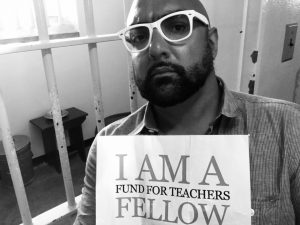This February, Fund for Teachers is celebrating Black History Month by highlighting some of our Fellows’ journeys to bring a better understanding of the African American experience to all students. In this four-part blog series, we’ll be diving into everything from the Transatlantic Trade to student advocacy. Our Fellows explored how Black history is taught in our last blog. This week, we are taking a deeper look at how Fellows Merle Rumble, Melissa Petropoulos and James Petropoulos are reframing black history to help students identify with their heritage and with others. Read on to learn more about their experiences in the classroom and how they are honoring Black History Month in their schools.

At the International Civil Rights Center & Museum with the Greensboro Four who staged a sit-in at Woolworth in 1960.
Although African American herself, Dr. Merle Rumble realized her knowledge of civil rights pioneers lacked a breadth and depth she wanted to share with third graders at Fox Run Elementary in Norwalk, CT. The ephemeral Martin Luther King Day left untapped the vast legacies of those who came before and after the progressive leader. She decided to embark on an independent tour of civil rights sites across nine southern cities with her Fund for Teachers grant to increase her understanding and inspire students to see themselves in the achievements of African Americans.
“I wanted to help my students not only to dismantle the false assumptions of African Americans being relegated to slaves and protestors, but also develop their appreciation for the positive impact and contributions of those whose struggled and persevered,” said Merle.

Merle’s students deliver presentations on their African American heroes.
Through guided tours and impromptu interviews, she gathered materials to inform four new units: Africa to slavery, Rosa to Martin, The Civil Rights Movement and African American Heroes. Students are now researching African American heroes and learning songs and poems from the Civil Rights era, inspiring them to identify with those leaders’ achievements.
Looking more deeply into the lives of enslaved Africans during the Colonial Period led Melissa and James Petropoulos‘ students to reconsider how unique they all are. After learning about the unique contributions made by African Americans whom Melissa and James researched on their fellowship, their fourth graders organized a school-wide Unity Day assembly.
“Focusing on humanizing the slave as a person instead of the person as a slave helped students respect what slaves endured,” said Melissa. “Their response was increased empathy for each other.”

In this celebration of kindness, acceptance and inclusion, student pieced together their individual identities to form this Unity Wall. Each description, together, represents the diverse community that Roywaton Elementary strives to be.
While the name of our organization is Fund for Teachers, students are equal beneficiaries of the $27 million in grants awarded since 2001. These teachers crafted fellowships around what they felt would most impact their students. Consequently, students – for years to come – will see themselves and their ancestors in a whole new light.
We thank Merle, Melissa and James for sharing their experiences and their students’ learning. Make sure to check our Black History Month feed on our blog here. Next week, we’ll be exploring how FFT Fellows are assessing the past and present in terms of black history. Stay connected and find out when it’s live by following us on Facebook, Instagram and Twitter.
Read our first installment in this series here.


